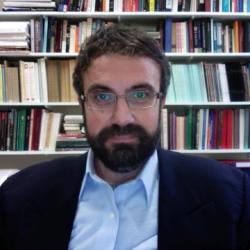Job Titles

Department of Archaeology
I conduct research on ancient Egyptian social and economic history, the administrative structure and management practices of the ancient Egyptian state, as well as language and texts (including epigraphy and palaeography), particularly of the earlier periods of Egyptian history (ca. 3000-2000 B.C.)
I am currently engaged in a field project at the pyramid of Sinki in South Abydos in Egypt, which dates to c 2500-2600 B.C. Although I consider myself to be a specialist of the earlier periods of Egyptian history I maintain a special interest, both in my research and teaching, in all phases and scripts of the Egyptian language spanning four millennia.
I am presently involved in the following research projects in:
I am in the process of preparing an extensive study of the Old Kingdom Gebelein papyri, which represent the economic accounts relating mostly to textile production and management in an Egyptian town from ca. 2500 B.C. Notwithstanding the importance of translating the papyri, which I am also carrying out, the objective of this endeavour consists of the examination of the complexities inherent (but not immediately evident) in the management of human and material resources, record keeping and scribal practices in a rural community in third millennium Egypt, as borne out by these ancient documents.
I am also directing a field project at an Old Kingdom step pyramid site in South Abydos, which is among the earliest stone monuments in Egypt (ca. 2500-2600 B.C.) and one of the very few non-funerary pyramids. The project aims to establish the purpose and function of such early royal structures within the broader social and administrative landscape of the time. There is a strong correlation between this and my text-based research in their chronological correspondence and their potential to allow the study of major elements of the system of government of southern Egypt more than 4500 years ago.
|
[1] |
Papazian H. (2024). Alterity, Amalgamation, and Royal Identity in Early Egypt. F. D. Scalf & B. P. Muhs (eds), A Master of Secrets in the Chamber of Darkness: Egyptological Studies in Honor of Robert K. Ritner Presented on the Occasion of His Sixty-Eighth Birthday. Studies in Ancient Cultures 3, Chicago, 233-246. |
|
[2] |
Papazian H. (2018). Life and Labour in the Twin Towns: the View from Old Kingdom Gebelein. P. Collombert and P. Tallet (eds), Les archives administratives de l'Ancien Empire. État de la question: actes de la table ronde tenue à Paris, 12 et 13 février 2015. Bern: Peter Lang. |
|
[3] |
Papazian H. (2017). Converters in Old Egyptian. R. K. Ritner (ed) Essays for the Library of Seshat. Studies in Ancient Oriental Civilization 70. Chicago: The Oriental Institute, 233-253. |
|
[4] |
Papazian H. (2015). ‘The State of Egypt in the Eighth Dynasty’, Harvard Egyptological Studies I, 393-428. |
| [5] | Papazian H.(2013). The Central Administration of the Resources in the Old Kingdom: Departments, Treasures, Granaries and Work Centers. J.C.M. García (ed), Ancient Egyptian Administration. Leiden: Brill. 41-83. |
| [6] |
Papazian H. (2012). Domain of Pharaoh, (Hildesheimer Ägyptologische Beiträge 52) Hildesheim: Gerstenberg. |
| [7] |
Papazian H.(2010). The Temple of Ptah and Economic Contacts Between Memphite Cult Centers in The Fifth Dynasty. M. Dolińska and H. Beinlich (eds), 8. Ägyptologische Tempeltagung: Interconnections between temples. Warschau, 22.-25. September 2008. Wiesbaden: Otto Harrassowitz Verlag. 137-153. |
| [8] | Papazian H.(2008). Perspectives on the cult of Pharaoh during the third millennium B.C.: a chronological overview. H. Vymazalová, M. Bárta and H. Altenmüller (eds), Chronology and Archaeology in Ancient Egypt (The Third Millennium B.C.). Prague: Czech Institute of Egyptology Charles University. 61-80. |
NON-PEER-REVIEWED
I am involved in the teaching of the following courses:
As Co-ordinator:
I also contribute lectures to A1 World Archaeology and have also lectured for A10 Archaeological Theory and Practice I, A3 Introduction to the Cultures of Egypt and Mesipotamia, among other modules.
I am interested in supervising students who wish to study for an MPhil or a PhD in the following topics:
Past students

Postal Address:
Department of Archaeology
Downing Street
CB2 3DZ Cambridge
Information provided by:



© 2024 University of Cambridge